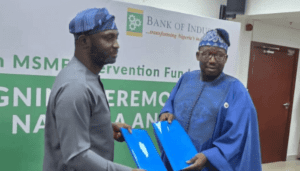

DBN disbursed N787bn to 495,000 MSMEs since inception – MD
The Development Bank of Nigeria (DBN) says it has disbursed over N787 billion to no fewer than 495,000 Micro, Small, and Medium Enterprises (MSMEs) since its inception to 2023.
It also said that the disbursement was with a focus on women and youth-led businesses.
According to the bank’s recently released cumulative, “Social Impact Report”, for the year ended 2023, 72 per cent of the beneficiaries were women, while 24 per cent were youth.
The bank’s Managing Director, Dr Tony Okpanachi, who spoke on the DBN’s achievements, said the bank had created over 1.2 million jobs and provided loans to MSMEs.
He emphasised the bank’s focus on profitability, necessary for financial sustainability and attracting funding to support its impact goals.
Okpanachi said that DBN had also trained over 3,500 MSMEs in various courses, such as business planning, accounting, and marketing.
Okpanachi said: “This holistic approach not only addresses financial needs but also empowers entrepreneurs to navigate challenges and seize growth opportunities.
“DBN established several partnerships with notable entrepreneurship-oriented organizations such as LBS, Google, GIZ, FSFM, GAIN, among others.
“As Nigeria strives towards sustainable development and economic resilience, following the policy reforms of the current administration, DBN remain committed to supporting MSMEs to unlocking their full potential.
“This is because MSMEs catalysts for inclusive growth and prosperity, through continued collaboration with stakeholders and strategic partners.
Speaking on the bank’s 2023 financials, the DBN boss disclosed that the wholesale development institution recorded a gross earnings of N52.4 billion and a Profit Before Tax (PBT) of N35.3B billion.
Okpanachi attributed the impressive performance to the improved support it received from its development partners and other critical stakeholders.
He disclosed that the stakeholders remained committed to bank’s vision of alleviating financing constraints faced by the Micro, Small, and Medium Enterprises (MSMEs) and small corporations in Nigeria.




